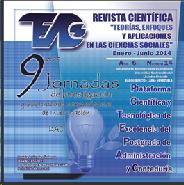Facebook® como herramienta de comunicación en la educación: usos y potencialidades para fomentar el aprendizaje colaborativo. Caso: estudiantes ingeniería agroindustrial
Palabras clave:
redes sociales, web 2.0, facebook, educación a distancia, aprendizaje colaborativoResumen
Las tecnologías de información y comunicación están cambiando el mundo y también han revolucionado la educación. El uso de redes sociales con propósitos educativos constituye un reto para el docente en el marco de los nuevos lineamientos curriculares que exigen diferentes escenarios para el aprendizaje. El presenta trabajo de investigación da muestra de una experiencia pedagógica colaborativa entre profesores y alumnos de la carrera de Ingeniería Agroindustrial en la asignatura Introducción a la Computación y la Electiva TIC y Gestión Tecnológica de la UCLA. Suscribimos que está se baso en el uso y potencialidades que nos permiten las redes sociales hoy en día, en especial la segunda más usada a nivel mundial como es Facebook, crear un grupo para organizar las comisiones de trabajo de las I Jornadas en TIC y Gestión Tecnológica. Con una simulación de la técnica de observación participante, seguimiento y una encuesta para medir el nivel de satisfacción, los resultados reflejan la aceptación de la experiencia, así como utilizar de manera adecuada y aprovechar al máximo los recursos, requieren de capacitación y aprendizaje permanente.
Descargas
Citas
Cobo Romaní, C.; Pardo Kuklinski, H. (2007). Planeta Web 2.0. Inteligencia colectiva o medios fast food. [en línea]. Grup de Recerca d'Interaccions Digitals, Universitat de Vic. Flasco México. Barcelona / México DF. E-book de acceso gratuito. Versión 0.1 /Septiembre de 2007. Web oficial del libro: http://www.planetaweb2.net/ (Consultado el 20-01-2008).
Facebook (2009). Declaración de Derechos y Responsabilidades. Fuente: http://es-la.facebook.com/terms.php?ref=pf . (Consultado el 28-02-2010).
Facebook (2013). Sala de Prensa. Datos Estadísticos. Fuente: http://www.facebook.com/press/info.php?statistics. (Consultado el 26-06-2013).
Fumero, A. y Roca, G. (2007). Web 2.0 [en línea]. Fundación Orange España. Fuente: http://www.fundacionauna.com/areas/25_publicaciones/WEB_DEF_COMPLETO.pdf (Consultado el 26-06-2013).
Handley, C.; Wilson, A.; Peterson, N.; Brown, G.; Ptzaszynksi, J. (2007). Out of the Classroom & Into the Boardroom. Higher Ed Consortium, Microsoft [en línea] http://www.microsoft.com/presspass/events/educause/docs/EducauseWhitepaper.pdf (Consultado el 12-06-2013).
Hornung-Prähauser, V.; Luckmann, M. & Kalz, M. (Eds.) (2008). Selbstorganisiertes Lernen im Internet. Einblick in die Landschaft der webbasierten Bildungsinnovationen. Innsbruck: Studienverlag.
Kirchman, D. (2010) Las redes sociales buscan un lugar en la educación. Fuente: http://www.rionegro.com.ar/diario/2010/027081265597144216.php. (Consultado el 08-02-2012).
Martín-Moreno Cerrillo, Q. (2004): Aprendizaje colaborativo y redes de conocimiento. Libro de actas de las IX Jornadas Andaluzas de Organización y Dirección de Instituciones Educativas. Granada, 15-17 de diciembre de 2004. Grupo Editorial Universitario, pp. 55-70.
Münch, L. y Angeles, E. (2001). Métodos y técnicas de investigación. Ediciones Trillas. México.
Nafría, I. (2007): Web 2.0, El usuario es el rey. Barcelona: Ediciones Gestión 2000, Planeta de Agostini. · O'Reilly, T. (2005): What Is Web 2.0. Fuente: http://www.oreillynet.com/pub/a/oreilly/tim/news/2005/09/30/what-is-web-20.html (Consultado el 28-04-2012).
Phillips, S. (2007). A Brief History of Facebook. Fuente: http://www.guardian.co.uk/technology/2007/jul/25/media.newmedia. (Consultado el 08-12-2009).
Rivero, M. (2010) Integración de las TIC a la educación. Fuente: http://www.lanacion.cl/integracion-de-las-tic-a-laeducacion/noticias/2010-01-07/003900.html. (Consultado el 11-01-2010).
Selwyn, N. (2007). Web 2.0 applications as alternative environments for informal learning - a critical review. [en línea]. Paper for OECD-KERIS expert meeting. Fuente: http://www.oecd.org/dataoecd/32/3/39458556.pdf. (Consultado el 15-07-2011).
Publicado
Cómo citar
Número
Sección
Derechos del/de autor/es a partir del año de publicación
Esta obra está bajo la licencia:
Creative Commons Reconocimiento-NoComercial-CompartirIgual 4.0 Internacional (CC BY-NC-SA 4.0)
Las opiniones expresadas por los autores no necesariamente reflejan la postura del editor de la publicación ni de la UCLA. Se autoriza la reproducción total o parcial de los textos aquí publicados, siempre y cuando se cite la fuente completa y la dirección electrónica de esta revista. Los autores(as) tienen el derecho de utilizar sus artículos para cualquier propósito siempre y cuando se realice sin fines de lucro. Los autores(as) pueden publicar en internet o cualquier otro medio la versión final aprobada de su trabajo, luego que esta ha sido publicada en esta revista.



